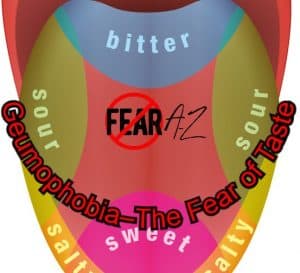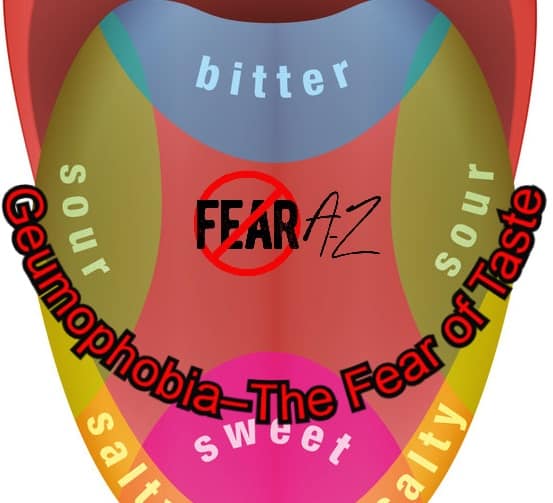Share This Article
Decoding Geumaphobia: The Fear of Taste
Do you get overly anxious just at the thought of tasting food? Or maybe you feel deep discomfort at the mere prospect of eating. You’re always scared of the unpleasant flavor food might leave in your mouth
If this is the case with you, you might be suffering from geumaphobia. Geumaphobia is a rare food phobia which involves the idea of flavor rather than the taste itself.
Is Geumaphobia a Phobia of Fear or Disgust?
Although it’s uncommon to encounter someone who dislikes food, this phobia does exist. Let’s look more into the reasons why people develop this fear and how to deal with it.

Everything You Need to Know about Geumaphobia
Geumaphobia Meaning
What is geumaphobia? Geumaphobia is a phobia or fear of taste. Also known as geumophobia, it is derived from the Greek words geuma for “taste'”and phobos for “fear.” Even though it’s rare, some people do suffer from this inconvenient phobia. People are often perplexed by this fear since they may question how taste can be threatening or disgusting. Is it simply a phobia of unpleasant taste? No, geumophobia is the fear of any taste or flavor.
Do I Have a Fear of Taste?
You may have geumophobia if certain tastes or flavors in your food lead you to the point of feeling anxious. This fear can hamper your lifestyle, especially if you have to eat meals regularly cooked by others, such as at canteens or in dormitory cafeterias. This pathological dread of flavors is accompanied by a range of symptoms that are difficult to miss, especially because it concerns an essential aspect of our life: food and nourishment.
Geumaphobia Causes
A majority of phobias can be traced back to a traumatic incident that triggered the phobia. In the case of geumophobia, for example, we might presume that the person was overfed a certain food, sweet or salty, during hospitalization or a traumatic incident in their life.
Or maybe it’s a learned response. A learned reaction or response is one that a person has acquired from their environment. Have you ever lived with someone who despised salty food? If yes, then this might have been the cause of your geumophobia. Furthermore, a negative reaction by friends and strangers to a geumaphobic’s anxiety and apprehensions can make them feel even more tense and hostile toward their phobia stimuli.
The third cause of geumophobia is genetics. Genetics tend to play a significant part in the development of phobias. Research shows that genetic and hereditary variables are to blame for many phobias we aquire.
Symptoms of Geumophobia
Geumophobia can manifest itself in several ways, both mentally and physically. Food or other edibles each have their own flavor, and we normally encounter food multiple times a day. As a result, you may experience symptoms multiple times a day as well.
In severe situations, the symptoms may manifest as anxiety or panic attacks. Note that different people have different symptoms; some may have severe symptoms, while others show only mild symptoms.
Mental/Emotional Symptoms
- Uncontrollable and obsessive thoughts about food
- The constant fear of tastes in foods
- Fear & anxiety
- Feeling detached
- Stress
- Avoiding street foods or food cooked by someone else
- Inability to sleep
- Anger, irritability & mood swings
- Social withdrawal
- Panic attacks
Physical Symptoms
- Trembling
- Cold/hot flashes
- Excessive sweating
- Dizziness & headaches
- Nausea or diarrhea
- Dry mouth
- Muscle tension
- Shortness of breath
How Do You Deal with Geumophobia?
When it comes to treatment, there are various options and steps you can take to prepare for confronting your fear, alleviating symptoms, and hopefully getting rid of the phobia altogether.
Self-Help: What Can You Do to Help Yourself?
Consider self-help and cost-effective methods to help combat geumophobia before turning to a medical expert. Phobias are primarily centered in our minds. Tastes and flavors do not endanger your life, and these measures may help you understand that, allowing you to manage your anxiety.
Lifestyle Changes
There are some lifestyle changes you can make that can help tremendously. These changes can sometimes reduce tension and anxiety, which can increase the intensity of the phobia. Start by getting adequate sleep. If you sleep fewer than eight hours each day, work toward making changes to achieve that goal.
Healthy meals are the second most essential lifestyle change you can make. This is where you may struggle. Finding the proper meals may be difficult, but try to invest time in healthy alternatives that won’t trigger your fear but will provide your body with the nutrients it requires. Also, remember to reduce the intake of stimulants and depressants, such as caffeine and alcohol.
Meditation, Exercise, and Yoga
Exercise and other physical activities are the most effective methods to improve mental and physical health. Meditation is also an excellent tool for developing mindfulness and reducing anxiety. Whenever you’re about to encounter food, meditate for a few minutes. Yoga is another excellent approach for decreasing stress and aiding in sleep for those who are kept awake by their anxieties and thoughts. Practicing yoga poses that focus on breathing and relaxation techniques can also help manage your symptoms.
Self-Help Groups and Social Therapy
Consider joining online or offline self-help or therapy groups for geumaphobia treatment. Interact with and get advice from individuals who have gone through similar experiences as you. Sometimes, finding people who will listen and understand you can be far more beneficial than being surrounded by those who don’t understand your fear.
Professional Help for the Fear of Flavor: The Options Available
Cognitive behavioral therapy (CBT) is one of the most effective techniques for managing phobias. It’s a therapy technique aimed at improving your mental well-being by attempting to change the way you think. It also helps you understand why you believe or react the way you do when exposed to foods. The goal of treatment is to determine the root of your fear and reduced the symptoms.
Exposure therapy is another treatment offered under the guidance of a mental health professional who will encourage you to confront your phobia. This is why it’s called exposure therapy. In the case of geumophobia, the therapist may ask that you taste foods or flavors that you have an aversion to. The more you’re exposed to it over time, the less severe the symptoms will be.
Learning to Cope with Geumophobia
Treatment methods may not guarantee a cure for your phobia. They will, however, assist in managing symptoms without causing harm to one’s health. Certain therapies may work effectively for some, while others may not. If you have a loved one who suffers from geumophobia, offer your love and support. Don’t mock them and never play a joke on them by exposing them to foods they fear. If you have the phobia, seek support from a person who is close to you and whom you can confide in.
Wrapping It Up
No matter how irrational others make it seem, your fears are real. The truth is they do affect you. However, keep in mind that if it’s impacting your daily life, you may need to convince yourself that you need therapy. Do what it takes to come to terms with your phobia. That is half the battle won.




